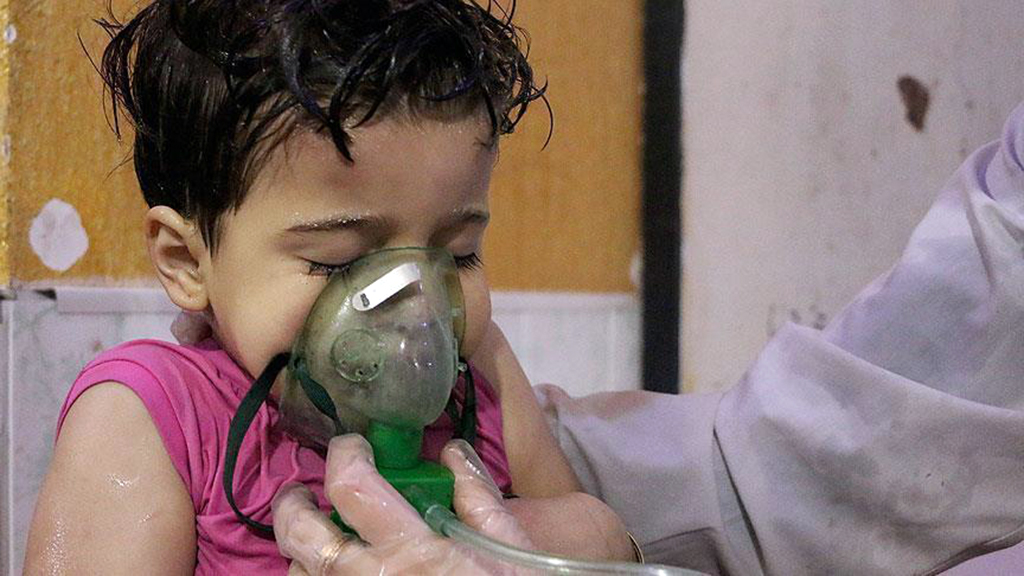
Threats and actions in response to the chemical attack in Douma
U.S. President Donald Trump criticized the Syrian regime for using chemical weapons on civilians in Douma, Eastern Ghouta, and threatened to use military power in response to this deplorable act.
Share
U.S. President Donald Trump criticized the Syrian regime for using chemical weapons on civilians in Douma, Eastern Ghouta, and threatened to use military power in response to this deplorable act. Trump's tweets about the Syrian regime and implicit threats to Russia generated diplomatic tension. The Trump administration is trying to mobilize and coordinate European partners France and Britain for a strong diplomatic and possible military response to the most recent chemical attack on civilians in Syria. Both the Syrian regime and the regime's main sponsor Russia denied the regime's use of chemical weapons in Douma. Denial of such an accusation was expected from Bashar Assad and Russia. What was not expected at this moment was the Trump's stern response to this humanitarian disaster.
This is not the first time that the Assad has committed appalling crimes against his population, and is not even the first instance of the use of chemical weapons on civilians. The regime has a terrible record of committing all sorts of war crimes against opposition groups during Syria's bloody civil war. The main question that still needs to be answered is why Trump responded to the Douma attack so strongly just a week after his public announcement about his willingness to withdraw U.S. troops from Syria.
Assad crossed red lines many times in the past and, so far, has paid negligible prices in return. No one believes the Trump's sincerity regarding the recent chemical attack. Trump will most probably not commit to the threats and promises he has made. During his presidency, Trump has openly criticized international institutions, norms, multilateral agreements and alliances. Trump's statements have made clear that he does not care about anything other than the U.S.'s material interests. What then are the motives for Trump to escalate the situation in Syria by deliberately targeting Russian influence in the region? A U.S. withdrawal from Syria would definitely facilitate Assad and Russia's quick victory in the Syrian civil war and leave more space and flexibility for Iran. This would also weaken the People's Protection Units (YPG), which is the only U.S. ally on the ground in Syria. Such a move could even trigger a YPG axis shift toward Russia and Iran. Israel would be unhappy about such a new configuration in which Iran and Russia would have an upper hand.
Trump plans to withdraw from Syria, but the power vacuum the U.S. would leave behind would be filled by either its political rivals or actors like Turkey that have been alienated in the last couple of years. Washington makes noise over the Douma attack to demonstrate that it is still engaged in the field and it also tries to coordinate trans-Atlantic allies that were alienated by Trump's reckless foreign policy decisions.The main problem is Iran's presence in Syria and Iraq. Both Israel and Saudi Arabia are highly disturbed by Iranian expansionism in the region. Trump's new foreign policy and security team now includes CIA Director Mike Pompeo as the presumptive secretary of state and former U.S. ambassador to the U.N. John Bolton as national security advisor. Both figures are known for their hawkish views on Iran and their position against the Joint Comprehensive Plan of Action (JCPOA), which was signed between Iran and the P5+1 – the five permanent members of the U.N. Security Council and Germany.
It is unlikely that Trump will certify the JCPOA, and this will escalate tensions with Iran. Iran's regional interests may target areas outside its borders. So far, the Trump administration has been compensated with generous arms and business deals by Saudi Arabia. Trump needs to deliver certain guarantees to Saudi Arabia in return for the economic benefits gained from Riyadh. Israel is also in favor of the continuation of the civil war in Syria, so Iran will be kept busy there. The Iranian threat in the region provides certain benefits to Washington and consolidates the actors that feel threatened by Iran around its orbit, which is why Trump will occasionally escalate tensions with Iran. Syria is a suitable context to manipulate this tension.The need for a strong and credible threat or a common enemy to mobilize Western allies and consolidate their cooperation is a concern for Washington.
Trump alienated his partners in Europe and elsewhere and signaled his unwillingness to deliver on security promises his country earlier made to his allies. A show of solidarity with Britain in the poisoning of the former Russian double agent Sergei Skripal was the first of such efforts to consolidate the trans-Atlantic alliance, which has been weakened by Trump's policies. The Skripal case was expected to create significant diplomatic tensions, but the problem was deliberately escalated to reconsolidate the trans-Atlantic alliance. In a context in which Daesh is no more the strong, evil enemy that would create a sense of unity and solidarity, reviving and heightening the image of the Russian threat is a suitable approach that serves this purpose.
In the dearth of shared values, interests and institutions, which Trump purposefully batters, images of shared threats and enemies will continue to be magnified and used as justification. If the U.S. and European countries had demonstrated their humanitarian concerns with concrete, preventive measures in Syria and elsewhere before, the recent tension could have been interpreted as a promising step. However, the recent tension that is connected to the use of chemical weapons on civilians in Douma rather seems like a PR campaign by Washington. A campaign that aims to consolidate Washington's neglected allies against the Iranian and Russian threats along with Assad. Trump's credibility problem is the most important obstacle to the success of this campaign.
[Daily Sabah, 13 April 2018]
Tags »
Related Articles






